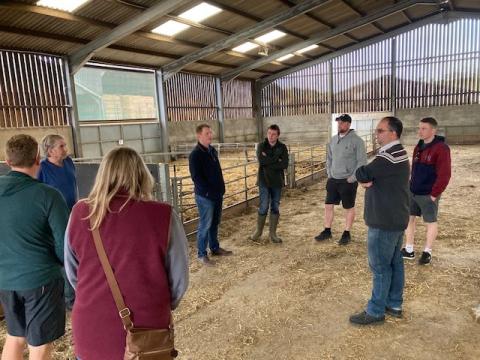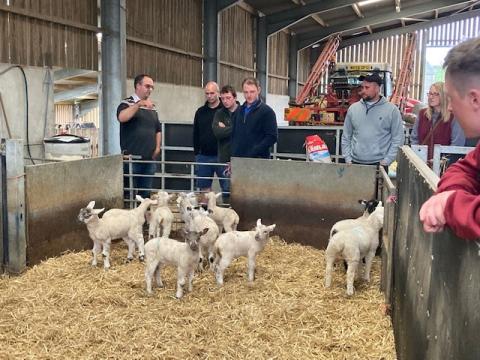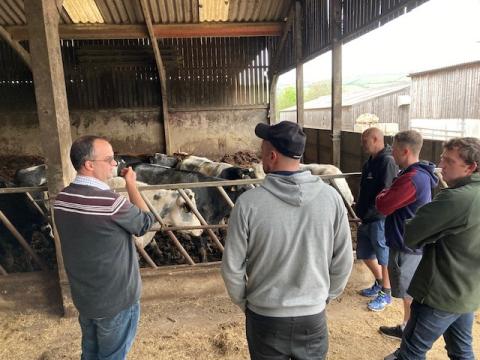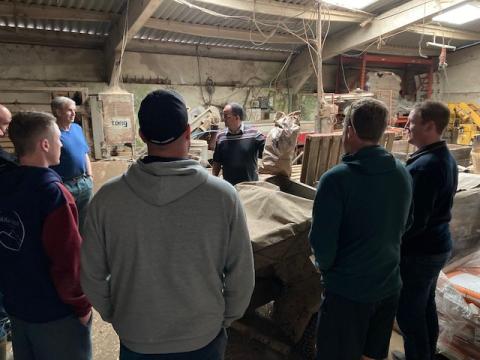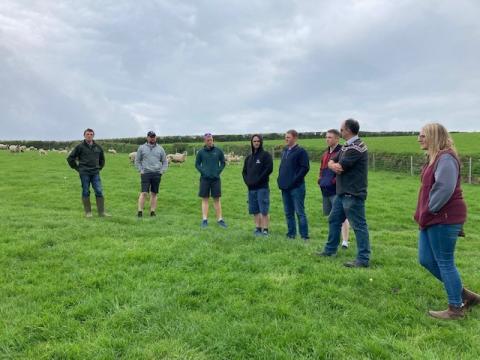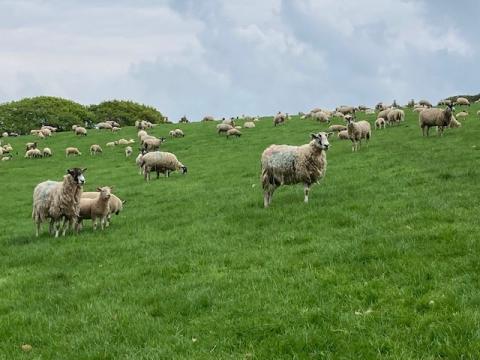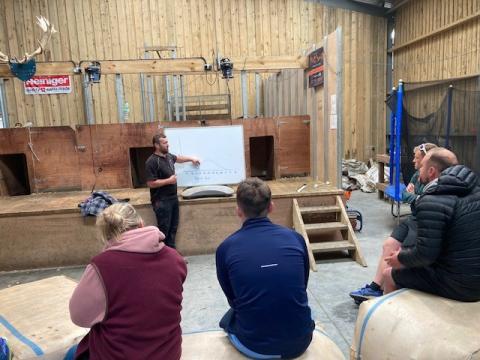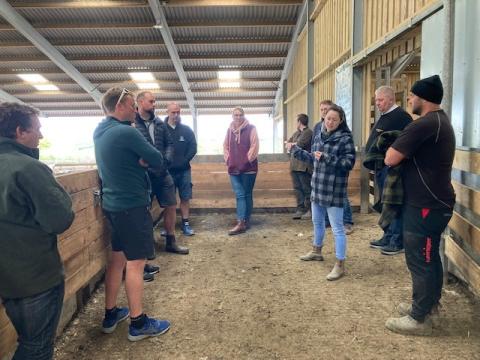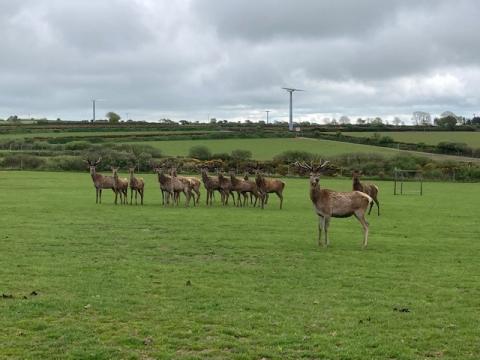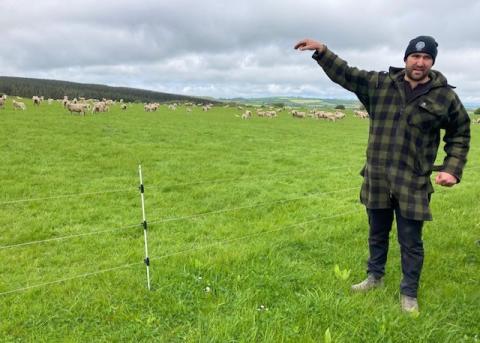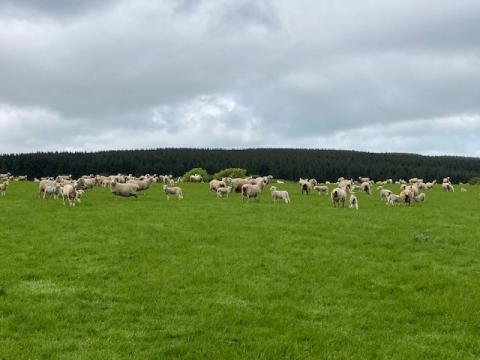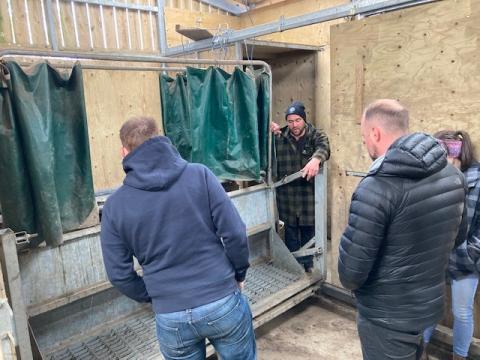Farming Connect Study Visit - South Wales sheep and beef discussion groups
Funded through the Knowledge Transfer, Innovation and Advisory Service programme under the Welsh Government Rural Communities – Rural Development Programme 2014 - 2020
South Wales sheep and beef discussion groups
Cornwall
3 - 4 May 2022
1 Background
The South Wales sheep and Gower beef discussion groups have been facilitated by the local Farming Connect development Officer, Hannah Wright, for a number of years, and have heavily focused their discussion group meetings on reducing their input costs, with the aim of maximising outputs. With both discussion groups coming to an end in August 2022, the groups were interested in having a study tour to visit farms in the south-west of England.
The aim of the study visit was to learn and gain knowledge from farmers who have made key business decisions about their farming systems in order to improve their business and enterprise efficiencies. Both visits aimed to provide information on:
- Innovation and diversification
- High animal health and welfare status
- Livestock genetics
- Benchmarking
- Grazing utilisation
- Carbon footprinting and farm biosecurity measures
- Environmental policies
The main learning outcomes from the study visit attendees were to:
- Gain knowledge about the different farming systems, including grazing, stockmanship, nutrition, performance and recording data, and to see if there were any potential changes that the farmers could make to their own systems in Wales.
- Inspire the group to venture more by looking at different diversification projects and building rapport with potential consumers.
- Improve the group's knowledge about new technology with grassland/soil management, precision grazing – especially around carbon footprinting – and agricultural environmental schemes.
1.1 Attendees
Dan Pritchard
Lloyd Williams
Rhys Edwards
Jacob Anthony
Jonathan Howells
David John
Jennifer Roberts
Hannah Wright
2 Itinerary
2.1 Day 1 - 3 May 2022. Dupath Farm. Adrian Coombe
Adrian Coombe – Dupath Farm
The group arrived with Adrian at 2.30pm on 3rd May after a four-hour bus journey from south Wales down to Cornwall. Adrian and his father Peter gave a warm welcome to the group on arrival and provided a detailed tour of the farm.
- 360-acre farm, of which 90% is owned, comprising arable, potato, sheep and beef enterprises
- Ewe numbers: 540 North Country mules, with 120 ewe lambs, which are all sourced from one farm. The main flock is all part of the ‘Ram Compare’ project, and the majority of the lambs are sold direct to slaughter to Dunbia at Llanybydder
- Cattle numbers: 127 mainly dairy-bred Aberdeen Angus. Dupath Farm has a separate grazing T.B. unit for 100 weaned calves. All EID tagged on arrival and BVD tagged if from a farm of unknown status. Everything finished on the farm and sold directly to slaughter.
- Arable enterprise includes 37 acres winter barley, 13 acres winter oats, 19 acres of spring barley and four acres of potatoes.
- Diversification: 60kW log biomass boiler. 3x 4kW solar panel system. Small farm shop which Adrian's father started, where they retail 850 Christmas trees.
- Business aims have been to improve grassland management and overall efficiency across the business
- AHDB Strategic Farm
Adrian has focused heavily on his grazing management systems and animal health status, whilst also looking at different diversification options to help secure the future of his family business. Being part of the AHDB Strategic Farm programme, he is keen to pass on any knowledge he has gained to other farmers looking to improve their businesses within these areas.
The group reflected on the visit at Dupath Farm on the one-hour bus journey to their hotel, and discussed in detail the flock health and management aspects of Adrian’s business.
2.2 Day 2 - 4th May. Trefranck Farm. Matt and Pippa Smith
Matt and Pippa Smith – Trefranck Farm
The group left the hotel at 9am and made the one-hour bus journey down to Trefranck Farm, where again a warm welcome was received from Matt and Pippa and their team. The group began their tour by having a presentation in Matt's self-built wool-handling shed about their farming system and what they are trying to achieve for future generations.
- 125ha owned and 53ha rented.
- 1000 ewe Romney flock.
- Majority of flock sold as breeding stock with only a small amount (roughly 500 lambs) finished on farm.
- Striving to constantly improve the flock, breeding for reliance, specifically around anthelmintic resistance, is a key focus, say Matt and Pip, with anything chosen to stay at the farm selected primarily on worm tolerance initially. Resilience over resistance with regard to their worming plan, based on the growth rates of the lambs.
- Grazing system. Rotational grazing system for the sheep on a chicory, plantain, clover and rye mix. Worked a lot with Precision Grazing to get their system set up.
- Data-driven business decisions – especially around breeding policy, with animals regularly weighed to follow daily liveweight gain (DLWG), while imported genetics have been used with a view to improve stock performance.
- Diversified into venison production a number of years ago, and have built a purpose-built slaughterhouse on farm. Currently 600 hinds.
- Matt has recently started a new diversification on the farm by offering shearing training days, to teach and support new entrants and young farmers wanting to start working in agriculture. He has also done a lot of research around the carbon storage of wool to help promote the product to other industries.
- Farming future and innovation are the core business decisions for both Matt and Pippa
A drive to help and encourage young people is also a primary motivator for Matt and Pip, with hosting farm walks to chefs who show an interest and use their West Country Venison produce in their restaurants, or welcoming people on work experience among activity at Trefranck while Matt (who completed a world shearing record in 2016) regularly teaches in a four-stand purpose-built shearing shed, which was built shortly after the couple took over the farm.
After four hours spent with Matt and Pip, the group travelled back home to south Wales and spent a lot of time discussing and comparing the two farming systems they had visited. They reflected on the data recording and benchmarking aspects of both businesses, which was extremely evident at both farms, and questioned the grazing, nutrition and livestock housing methods.
3 Next Steps
Since returning from their study tour, the group members have reflected on the information they have received and have raised further questions for discussion in their study tour WhatsApp group. Many of the group members have been looking at diversification options for their businesses, as well as looking for further advice on improving their benchmarking data and animal health statuses.
The South Wales sheep and beef discussion group study tour members of 2022 would like to take this opportunity to thank everyone who welcomed them in Cornwall, and for allowing them to visit their farms over the two-day period. They would like to thank Farming Connect for their continued support and funding towards knowledge transfer, as this study tour has provided them with invaluable experience and knowledge for many years to come.

